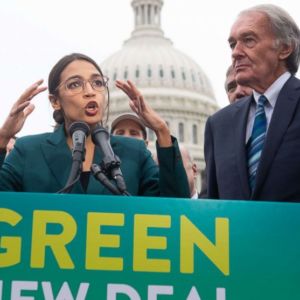The cost of the Green New Deal may hit consumers too hard to make it through the U.S. Congress, even if Democrats sweep the 2020 elections. But get ready for federal litigation racking up legal bills for taxpayers.
On Wednesday, a U.S. House Oversight subcommittee will host a hearing, “Examining the Oil Industry’s Efforts to Suppress the Truth about Climate Change.” A hearing like this featuring “Squad” members U.S. Reps. Ayana Pressley and Alexandra Ocasio-Cortez — fresh off the latter’s endorsement of Democratic Socialist Sen. Bernie Sanders — should make for quite a show. The Squad has been pushing its proposed Green New Deal despite reservations from some of its fellow Democrats who fear the plan’s price tag: An estimated $70,000 in costs per household in the first year alone for energy, housing, transportation, and shipping.
But this week’s hearing will also advance another strategy being pursued by green extremists, one already responsible for costly legal bills to taxpayers across the country. Based on the hearing’s witnesses, it appears that if Democrats win the White House, they will push forward with partisan climate litigation targeting energy companies, prosecuted by the federal government and paid for by taxpayers.
The litigation strategy dates back to a now-infamous 2012 conference of anti-fossil fuel activists in La Jolla, California. The activists planned out a series of lawsuits modeled after the RICO cases that targeted tobacco companies in the 1990s. Those lawsuits are already being pursued in a number of states at the urging of key La Jolla participants, including Naomi Oreskes and Sharon Eubanks, both of whom will be testifying at the hearing Wednesday.
Oreskes and Eubanks, along with another La Jolla organizer, Matt Pawa, have been instrumental in drumming up support for these lawsuits among state attorneys general. Emails obtained through freedom of information requests reveal Pawa and Eubanks met with the state attorneys general from states like New York, Vermont and Illinois to plot out the legal strategy.
That strategy failed. Disgraced New York Attorney General Eric Schneiderman was the ringleader of the state efforts, coordinating with other attorneys general across the country. But after seeking substantial publicity for the launch of coalition efforts, Schneiderman was forced to abandon the RICO strategy and provide proof that ExxonMobil lied to the public. Instead, he then tried to shift his argument to a claim that the energy company should have been clairvoyant in its investor communications to realize that its reserves may ultimately be left in the ground because of political action against fossil fuels.
That has yet to happen. And the U.S. Securities and Exchange Commission investigated this issue for two years, ultimately closing its investigation into how ExxonMobil values its assets.
Oreskes, for her part, helped drum up support for litigation by producing a bogus study. Oreskes, a historian and not a scientist, began her research from a preconceived notion that ExxonMobil should be prosecuted. She spoke about the energy company’s guilt years before she produced a study to back up her claims.
That study, bankrolled by anti-fossil fuel financiers at the Rockefeller Family Fund, completely conflates basic facts. Oreskes and her coauthor attempt to prove that ExxonMobil knew about the risks of climate change from internal scientific research, yet at the same time issued public statements in advertorials that expressed doubt. Thus, the argument goes, the company lied to the public.
Well, not exactly. ExxonMobil is the result of a 1998 merger. During most of the time period studied by Oreskes, Exxon and Mobil were two separate companies. The internal documents expressing concern over climate change were released publicly by Exxon in academic journals, and the advertorials studied were produced by Mobil.
Professor Kimberly Neuendorf, an expert in content analysis cited in the study by Oreskes, reviewed the data and found it did not meet “basic standards of scientific inquiry.” She summarized: “In short, the [Oreskes study] is unreliable, invalid, biased, not generalizable, and not replicable.”
But despite the failure of the lawsuits, the debunked study, and the high cost to taxpayers, expect Oreskes and Eubanks to call for further action by the federal government to continue their campaign. Eubanks, speaking with ThinkProgress earlier this year, called for the 2020 Democratic candidates to also focus on the issue.
“This intentional spread of misinformation [by companies like Exxon] should be examined through a legal lens, and the federal government absolutely should look at potential lawsuits — and the candidates should be asked their positions on this,” she said.
Whether it’s at the ballot box or before the judicial bench, Democratic extremists are going to pursue their energy policy assaults by any means necessary.

